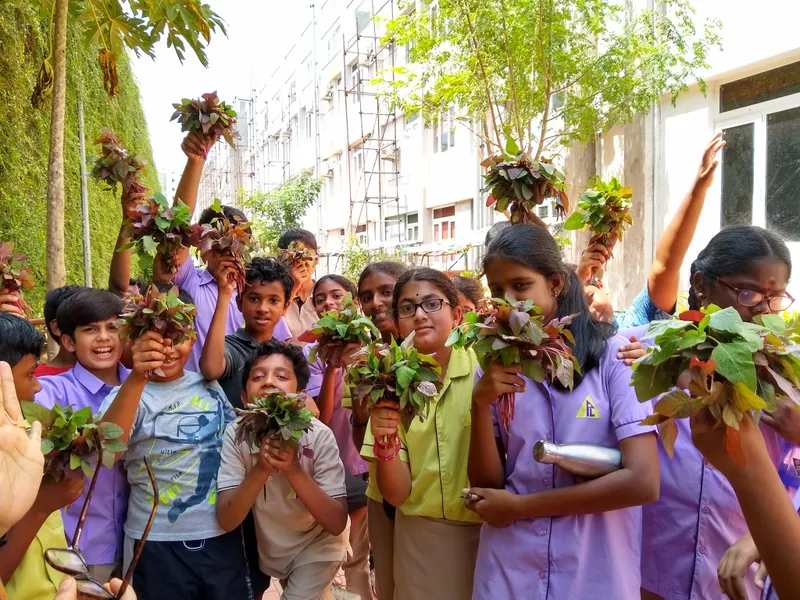Nurturing nature: Maya Ganesh's journey from corporate to cultivator
Maya Ganesh left a lucrative corporate career at the age of 38 to work in the environmental sector. Today, she helms a school garden that grows rare, native fruits and vegetables organically and inspires students to become changemakers.
For the last six years, Maya Ganesh has been inculcating a sense of sustainability in students in Tamil Nadu through regenerative agriculture.
"Regenerative agricultural practices mimic nature," she explains.
Ganesh's passion for environmental restoration can be traced back to 1995 when she had just finished her undergraduate studies and discovered her interest in environmental economics, sparked by the Brundtland Commission.
The sub-organisation of the United Nations released a report in 1987 titled ‘Our Common Future’ which set forth a definition of sustainable development for the global community when public awareness and professional opportunities in the field were still nascent.
“At the time, a career in the environmental sector was not seen as remunerative. People thought it didn't exist," Maya tells SocialStory.
However, owing to family pressure she couldn't pursue a career in environmental economics.
"I ended up doing what everybody was doing, which was an MBA. And then I ended up in the corporate sector," she recalls. Despite a successful corporate career, her passion for environmental work lingered.
It was her mother's encouragement that sparked a turning point. "When I was 38, she said, 'Why don't you do it now?'" Maya recalls. Initially hesitant about starting from scratch, she eventually pursued a Master's in Environment and Sustainable Development in the UK.
"It was a course I loved to bits," Maya says.
Her fascination for urban agriculture and political ecology, taught by one of her professors, further fuelled her passion. Inspired by London's allotment system, where residents could grow their food on government-allocated plots, Maya immersed herself in community-driven sustainable initiatives in East London.
Planting seeds of change
When she was struggling with financial constraints on making a career shift, Maya met Gita Jagannathan, the principal of APL Global School, in 2016 on the advice of a friend. On a whim, she walked into Jagannathan's office to propose the idea of a school garden as an interdisciplinary learning space.
"It would be therapeutic, community-driven, and an opportunity for education in sustainability through regenerative practices," she explained, highlighting the benefits of water resource management and soil conservation.
Six months later, Maya received a call from Jagannathan, who informed her the campus was being shifted. Maya suggested they don't do any landscaping in the school and let her instead create a school garden.
The project was designed as an extracurricular course where students could learn about organic farming—what Maya refers to as "regenerative agriculture."
"We started with grade seven," she recalls. "Starting from scratch was a lot of work, but with some labour, the garden began to take shape.

Students with a fresh harvest of spinach from the garden at APL Global School
By July 2018, students had created two forest patches, digging pits, adding biomass, and planting diverse crops. "Years later, these students are seeing the fruits of their work," she says proudly. The main goal of the initiative was an education for sustainability (EFS), emphasising the use of open-pollinated and heirloom seeds, which are more resilient to climate change and offer greater biodiversity.
The activity is now open to students from kindergarten to Class 12.
"We grow varieties of beans, including purple pole beans and bush beans," says Maya. "In Tamil Nadu, we have indigenous cotton varieties, such as karungani cotton and even some unique colours like brown and green cotton."
She educates the students on the importance of preserving these traditional varieties through seed saving, ensuring they understand the value of biodiversity.
Since 2019, the garden has expanded, and the programme has become financially self-sustaining. Students harvest crops as part of their classes.
Maya emphasises that the garden is not a production unit; it's a learning space. "The kids take home some of the harvest, and the mothers are happy. They sell the surplus produce to the school community, allowing the garden to fund its tools and resources.
"We send out a list of what’s available, and they choose what they want," Maya explains. This model not only engages the students but also fosters a sense of responsibility and appreciation for sustainable practices.
Regenerative farming: The way forward
Maya highlights the importance of biodiversity, using the example of a forest where various plants, trees, and ground cover coexist, supporting each other.
"You'll never find a natural forest which has only eucalyptus or only apples," she says. Regenerative farming, unlike monoculture, involves growing multiple crops together, which helps maintain soil health and resilience against pests and diseases.
"In one acre, you will end up growing maybe 20 or 30 different crops," she says. While this approach may not yield large quantities of a single crop, the overall productivity is high, and it promotes a sustainable ecosystem.
Maya also emphasises the importance of surpassing traditional supply chains to make regenerative farming profitable. “By directly selling produce to consumers, farmers can achieve better returns and reduce the environmental impact of long supply chains,” she says.
Edited by Kanishk Singh






